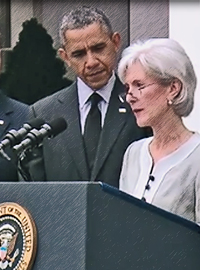| Sebelius’ Legacy is a More Politicized HHS |
 |
|
By Ashton Ellis
Wednesday, April 23 2014 |
In the nearly two weeks since Kathleen Sebelius resigned as Secretary of Health of Human Services, many pundits have tried to sum up her legacy. Immediate focus has centered on the disastrous rollout of Healthcare.gov, the federal insurance exchange website that failed spectacularly when it launched. The glitches were so bad and the repair job so long that every piece of bad news served to undermine the public’s confidence in government’s ability to carry out complex work. Supporters point to Sebelius’ statement that 7.5 million Americans had signed up for coverage as a sign that things have turned the corner, allowing her to leave on a high note. But those numbers don’t tell the full story. Studies by McKinsey and RAND estimate that less than one-third of those applying for coverage on Healthcare.gov had no insurance before ObamaCare. Even success feels like failure. But while the website fiasco will undoubtedly go down in history as a Grade-A political and management blunder, two elements of Sebelius’ legacy are already certain. In five years at the helm, the former Kansas governor transformed HHS into the most powerful and politicized domestic federal agency. The power that ObamaCare gave Sebelius is unquestioned. In the text of the law alone there are more than 2,500 references to the HHS secretary. More than 700 times it says the Secretary “shall” do something. In more than 200 places it says she “may” do something. And on 139 occasions the law mentions instances where the “Secretary determines.” Sebelius used these powers to grant compliance waivers to corporate giants like McDonald’s and friendly teacher and agriculture unions. She also blessed exempting Members of Congress and their staff from the requirement that they use ObamaCare exchanges. And what wasn’t waived was eventually delayed. To date, Sebelius has issued more than 30 delays of key parts of ObamaCare. These include putting off the employer mandate twice, and scuttling the launch of legally required exchange websites for small business owners and Spanish language enrollees. ObamaCare deadlines have become a running joke. Frightened at the prospect of angry voters, Sebelius simply extended the deadline to sign up for coverage that started January 1, 2014. When it looked like Healthcare.gov would not hit the 7 million mark by the March 31 deadline, she unilaterally extended signups for another two weeks. And then she reported the total number of applications as though each one had actually completed the process by paying their premiums. Data from the insurance industry suggests up to 20 percent have not. Other deadlines have been moved to shield vulnerable Democrats from ObamaCare’s failures. After delaying the employer mandate until 2015, someone must have told Sebelius that the next enrollment period would begin October 1, 2014 – about one month before the midterm elections. The prospect of tens of millions of employees losing plans they like just weeks before Election Day was too much to bear. Without a hint of embarrassment, Sebelius decided to delay the enrollment period until mid-November, after voters go to the polls. Though an example of politicized regulating in the extreme, Sebelius’ tactics are at least consistent with how ObamaCare has been implemented. Remember, this is a law passed in 2010 that didn’t fully go into effect until 2014. In between was a presidential election, and President Barack Obama and his allies in Congress wanted to avoid any negative fallout from what is proving to be a massively unworkable law. Sylvia Burwell, whose nomination to succeed Sebelius at HHS must be confirmed by the U.S. Senate, will likely face unprecedented scrutiny. Already conservatives are preparing questions to test Burwell’s commitment to the rule of law, and whether she takes the same expansive view of her ObamaCare-related powers as Sebelius. Regardless of her answers, Sebelius set a precedent that won’t be expunged until ObamaCare is repealed. |
Related Articles : |
























